BMW BERLIN-MARATHON is the largest marathon in the world with 54,280 finishers
- Worldwide finisher record
- Exciting anniversary race
- Huge donation buzzer reached
- Photos, clip & rough cut available
The race had an emotional highlight right at the end: For it was Peter Bartel, of all people, one of the legendary finishers of the first edition in 1974, who crossed the finish line as the last runner - and thus the 54,280th. The 82-year-old was visibly overwhelmed as he accepted his medal.
The Ethiopians Milkesa Mengesha and Tigist Ketema claimed the top honours in the 50th anniversary race of the BMW BERLIN-MARATHON. In excellent weather conditions, cool and sunny, Mengesha triumphed in 2:03:17, the third fastest time in the world this year. Second to the 24-year-old was Cybrian Kotut of Kenya in 2:03:22 while the Ethiopian Haymanot Alew finished third in 2:03:31. The top times didn’t end there since Stephen Kiprop of Kenya ran 2:03:37 for fourth.
The best German finisher was Sebastian Hendel who sprang a surprise for a highly creditable improvement of his best to 2:07:33. This performance made him the fifth fastest German marathoner of all time. Tigist Ketema dominated the women’s race for victory in 2:16:42, the third fastest women’s time in the 50-year history of the race. She led her Ethiopian compatriots Mestawot Fikir and Bosena Mulatie home, the second and third placers finishing in 2:18:48 and 2:19:00 respectively. The leading German finisher was Melat Kejeta with 2:23:40 for eleventh place.
Tigist Ketema lief zu einem überlegenen Sieg in 2:16:42 und erreichte damit das drittschnellste Resultat in der 50-jährigen Geschichte des Rennens. Ihre Landsfrauen Mestawot Fikir und Bosena Mulatie belegten die Ränge zwei und drei in 2:18:48 beziehungsweise 2:19:00. Melat Kejeta (Laufteam Kassel) kam auf Platz elf nach 2:23:40 ins Ziel.
Overall the race still produced outstanding performances although no major records were broken. Taking both winning times into account, their aggregate of 4:19:59 made the 50th edition the twelfth fastest marathon in history and the fourth fastest ever in Berlin. For the first time in Berlin, four men went under 2:04. The anniversary edition attracted 58,212 starters from 161 countries.
Men´s Race
The pace was very fast from the start of the men’s race. Led by three pacemakers, 12 runners went through 10km in 28:42, on course for a finishing time in the region of Eliud Kipchoge’s course record of 2:01:09. The tempo proved to be too ambitious and after reaching halfway in 60:57 and the departure of the pacemakers by 25km, the pace slowed appreciably. Several kilometre splits were timed at over three minutes each – highly unusual for the Berlin race. The leading group was still sizeable by 30km with eight men going through in 1:27:21.
Five kilometres later the group had been reduced to four: the Kenyans Stephen Kiprop and Cybrian Kotut as well as the Ethiopian pair of Milkesa Mengesha and Haymanot Alew. While Alew and Kiprop dropped off the pace, the decisive point only came in the final kilometre shortly before the Brandenburg Gate. Milkesa Mingesha broke away from Cybrian Kotut to achieve the greatest win of his career.
“It was good that I didn’t come here as one of the big favourites so I could run without any real pressure. This personal best also shows what a huge advance I’ve made,” said Mengesha, whose previous fastest time was 2:05:29. There was solid reason for the home fans to celebrate as Sebastian Hendel showed good pace judgement before making up much ground in the second half.
Hendrik Pfeiffer was the first of his German compatriots to be overtaken, around 10km from the finish, then Filimon Abraham at 38km. “It was a great race and I was surprised at the end to be the top German finisher,“ said a delighted Hendel. He had only broken 2:10 in Hamburg this April, running 2:08:51, so to improve to 2:07:33 was a considerable achievement.
Women’s Race
In contrast to the men, the women’s race proved almost a start to finish solo win for Tigist Ketema, whose personal best of 2:16:09 made her the fastest on the start list by some distance. For a time she ran a pace on course for a sub 2:16:00 finish. Her fellow Ethiopian Azmera Gebru was the only rival who attempted to match her pace but she dropped back shortly before 20km while Ketema went through halfway in 67:53 on the way to achieving the second win in a major marathon this year, having triumphed in Dubai in January.
“I actually wanted to run a personal best but I am so pleased with the win and also the time,” said the 26-year-old Tigist Ketema. Ethiopians claimed the top three places with Mestawot Fikir finishing second in 2:18:48 followed by Bosena Mulatie in 2:19:00. Both improved their personal bests by several minutes, neither having broken 2:20 previously.
Despite mentioning she had been suffering from knee problems before the race, Melat Kejeta attempted to break the German record of 2:19:19 set by Irina Mikitenko in the BMW BERLIN-MARATHON 16 years ago. Melat Kejeta reached halfway in 69:43 but couldn’t hold that pace in the second half. “I tried but it was too fast. My legs became heavy and the knee started to hurt,” explained Kejeta after her 2:23:40 finish.
Swiss double victory for Catherine Debrunner and Marcel Hug
Racing wheelchair athlete Catherine Debrunner secures her third victory in a row at the BMW BERLIN-MARATHON. For exceptional athlete Marcel Hug, it is his ninth victory in Berlin.
Catherine Derbunner (1:35:23 h) outclassed the wheelchair racing competition by more than two minutes. In second and third place were Susannah Scaroni (USA, 1:38:01 h) and Manueal Schär (SUI, 1:41:14 h). “I'm a Gfrörli, as we Swiss say. I was pretty cold at the start, but that passed after the first few kilometers. The course is simply incredible. You can ride very fast and don't have to think so much,” said Debrunner after the race.
Marcel Hug won for the ninth time today in Berlin. He crossed the finish line after 1:27:18 h ahead of David Weir (GBR, 1:29:05 h) and Geert Schipper (NED, 1:30:33 h). “It was a lot of fun to ride the first few kilometers in such a big group,” said Hug. At kilometer ten, he increased the pace, initially followed by David Weir. But even the Brit was unable to keep up with the exceptional athlete.
Vico Merklein secures Berlin handbike triumph
Handbiker Vico Merklein took his seventh victory in his 19th participation. Born in Berlin, he rode a tactically clever race - especially when it came to the home straight. “When it became clear that it would come down to a final sprint to the finish in a three-man field, my experience as an old hand helped me.
I knew that under no circumstances should I pull away too early, even though it's really hard to hold back when you're looking at the Brandenburg Gate,” said Merklein. He relegated Michael Jergemann (DEN, 1:04:46 h) and Johannes Herter (GER, 1:04:46 h) to second and third place.
“Next year will be my 20th start and then it's over for me,” Merklein concluded. Today's women's handbike winner was Fransesca Porcellato (ITA, 1:17:44 h), ahead of Julia Dierkesmann (GER, 1:17:45 h) and Katrin Möller (GER, 1:18:47 h).


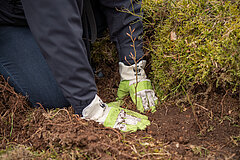
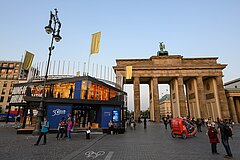
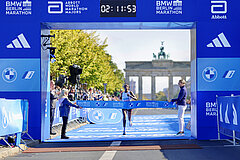
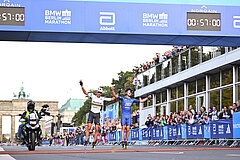
![[Translate to Englisch:] [Translate to Englisch:]](/fileadmin/_processed_/4/1/csm_Vater-Sohn-Freude_f8a7e6bd65.jpg)
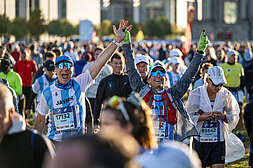
![[Translate to Englisch:] [Translate to Englisch:] Erschöpft und glücklich im Ziel des BMW BERLIN-MARATHON 2024 © SCC EVENTS / Tilo Wiedensohler](/fileadmin/_processed_/d/e/csm_Erschoepft-im-Ziel_418cc7eee2.jpg)